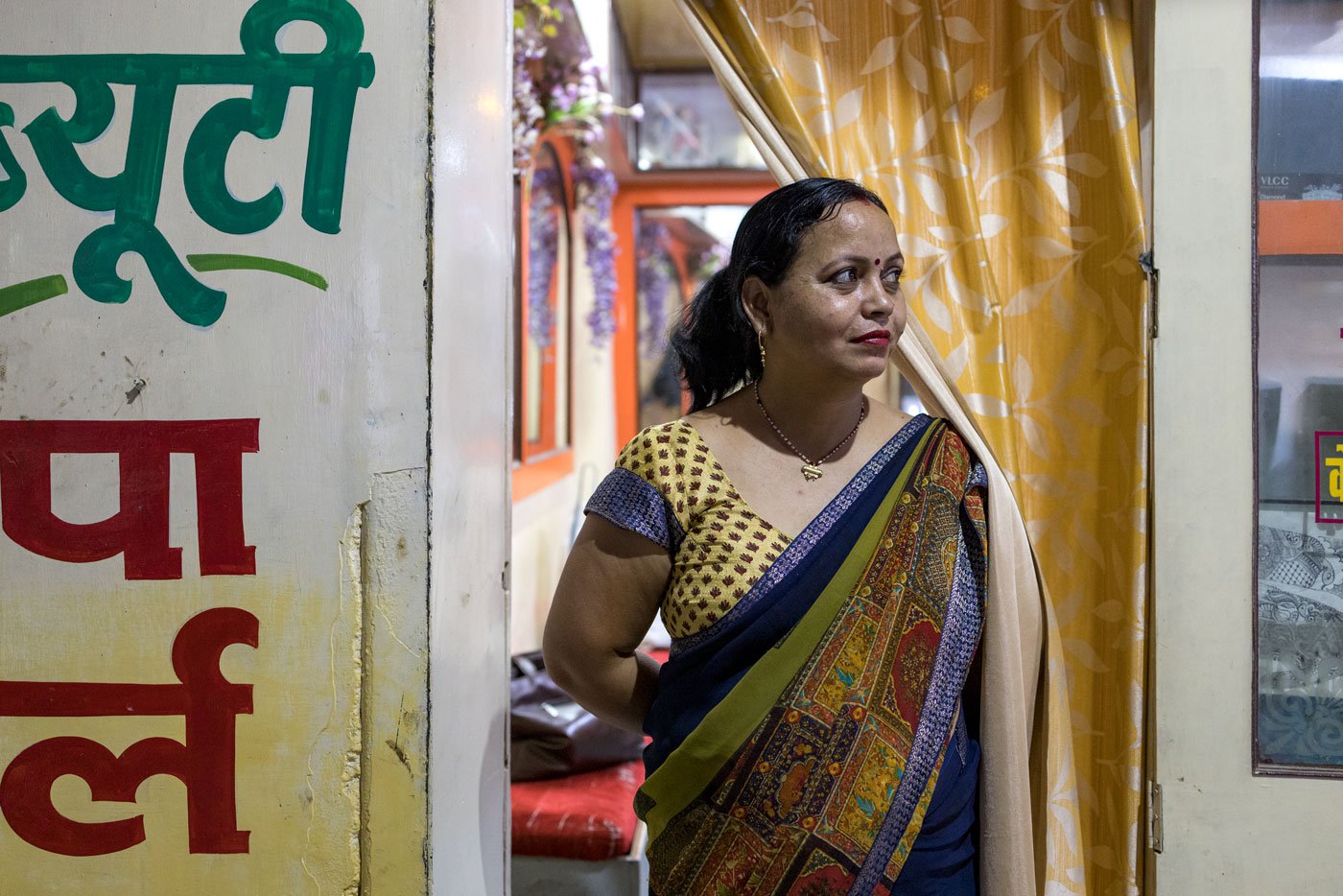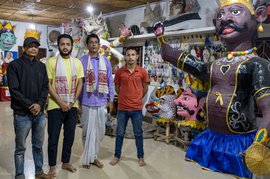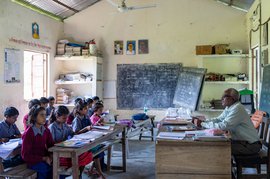“What’s the need to go to a beauty parlour? Just an excuse to roam the markets and spend money.”
Monika Kumari says her in-laws are suspicious of her visits to a beauty parlour. The family of four lives in Khairma village, around three kilometres from Jamui, a small town in eastern Bihar. Shrugging off their comments, the 25-year-old routinely gets her eyebrows shaped, hair from her upper lip removed and a facial massage when she feels like it. Her husband, who works in the panchayat office, doesn’t share the older generations’ distrust and will even drop her to the parlour.
Not just Monika, but many young girls and women in Jamui and surrounding towns and villages in Jamui district, head to the nearest parlour for a quick makeover.
“When I started, there were 10 parlours. Now it feels like there are a thousand,” says Pramila Sharma, referring to a span of around 15 years in which she has seen the beauty business in Jamui bloom.
Pramila is the owner of Vivah Ladies Beauty Parlour, set on the main road in Jamui town that has a population of 87,357. Most people here work in agriculture and allied fields.
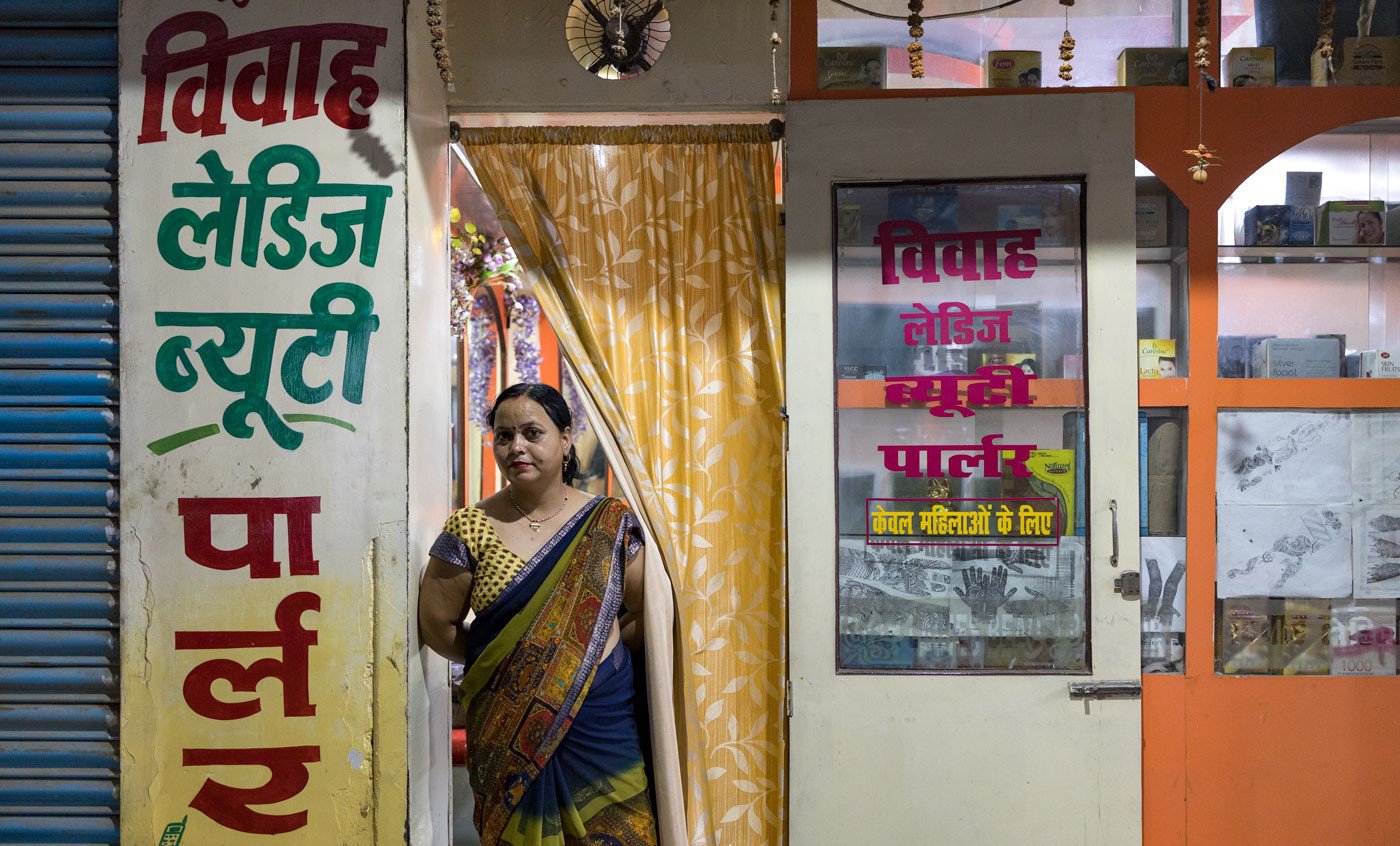
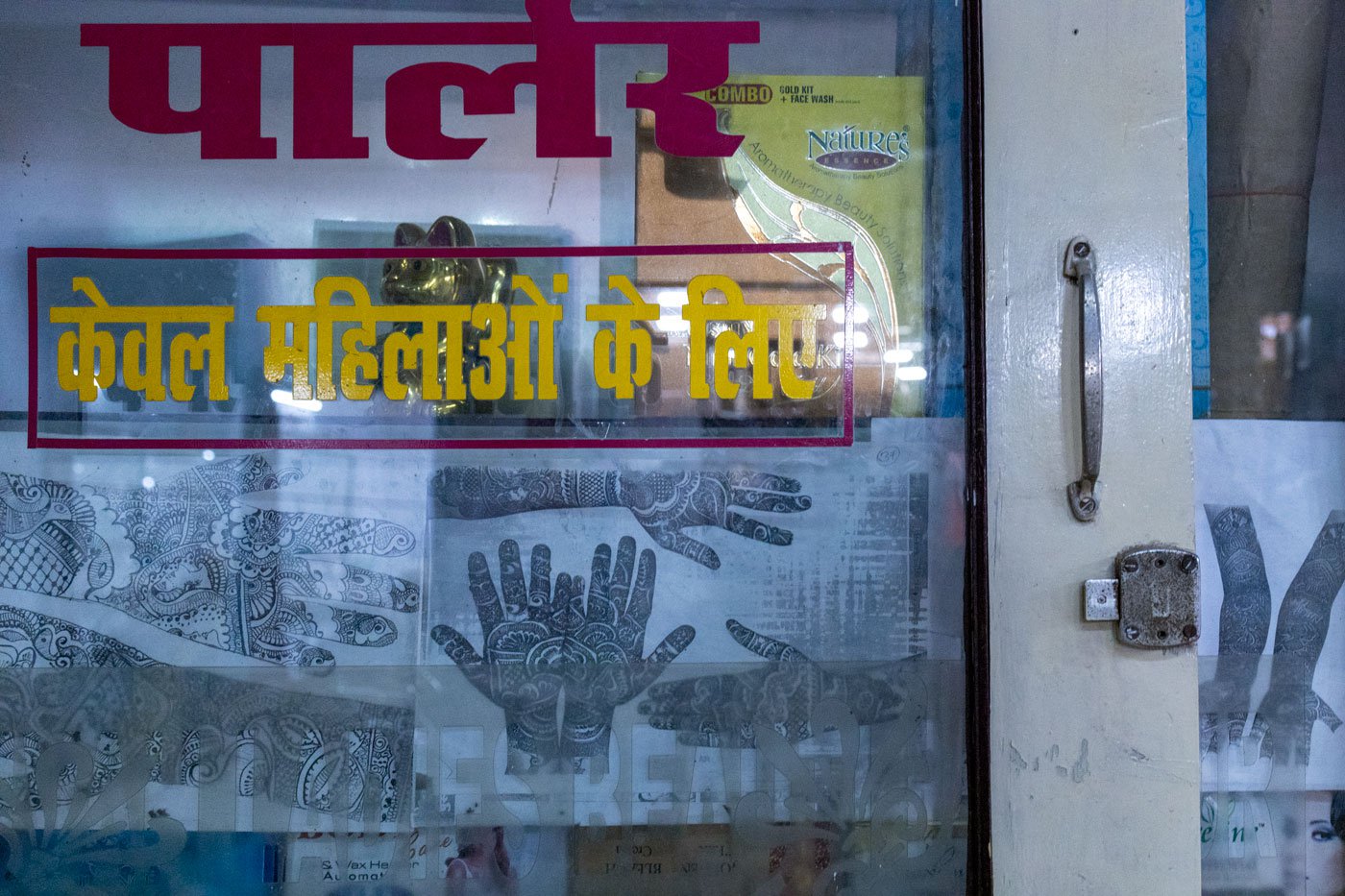
Left: Pramila Sharma owns and runs the Vivah Ladies Beauty Parlour in Jamui town. Right: There is a notice pinned outside stating ‘only for women’
The parlour is set amidst a cycle shop, a barber's and a tailor's. A full line-up of beauty services – haircuts, threading, mehendi (henna), waxing, facials and make-up attract clients from Lakshmipur and Islamnagar villages in Aliganj block, about 30 kilometres away.
Pramila says her working knowledge of languages such as Angika, Maithili and Magahi helps put customers at ease.
Running a beauty parlour in this corner of Bihar includes a constant tussle with patriarchy. “Before marriage, girls [here] live according to their parents’ wishes, and after marriage, according to their husband’s,” points out Pramila. So at her parlour, any male presence is strictly a no-no and a board outside clearly states ‘only for women’. Once inside the intimate all-female atmosphere offers a sense of security. Children and recipes are thrashed out, marriage alliances debated and discussed and marital disagreements get a sympathetic hearing. “Women often can't share what they are feeling at home, but here they can share anything,” she says.
A feature and sentiment that keeps customers loyal. "When we want to visit a parlour in Jamui, we return to the same one,” says Priya Kumari, explaining the draw of a familiar space. Getting ticked off or gently scolded by the beauty parlour owner only adds to the familial atmosphere. “She knows our life story and makes jokes with us,” says the 22-year-old resident of Khairma village in Jamui block.
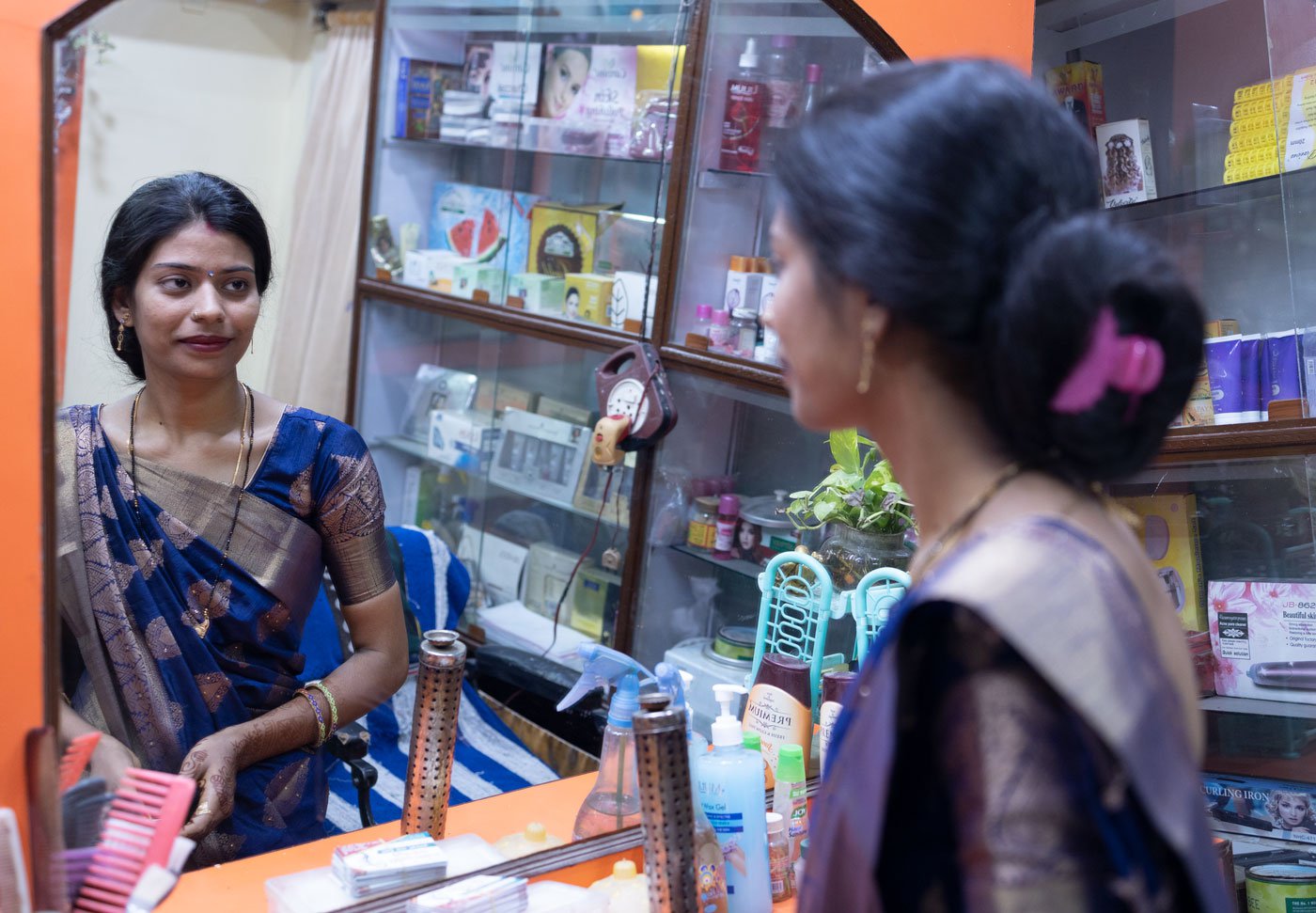
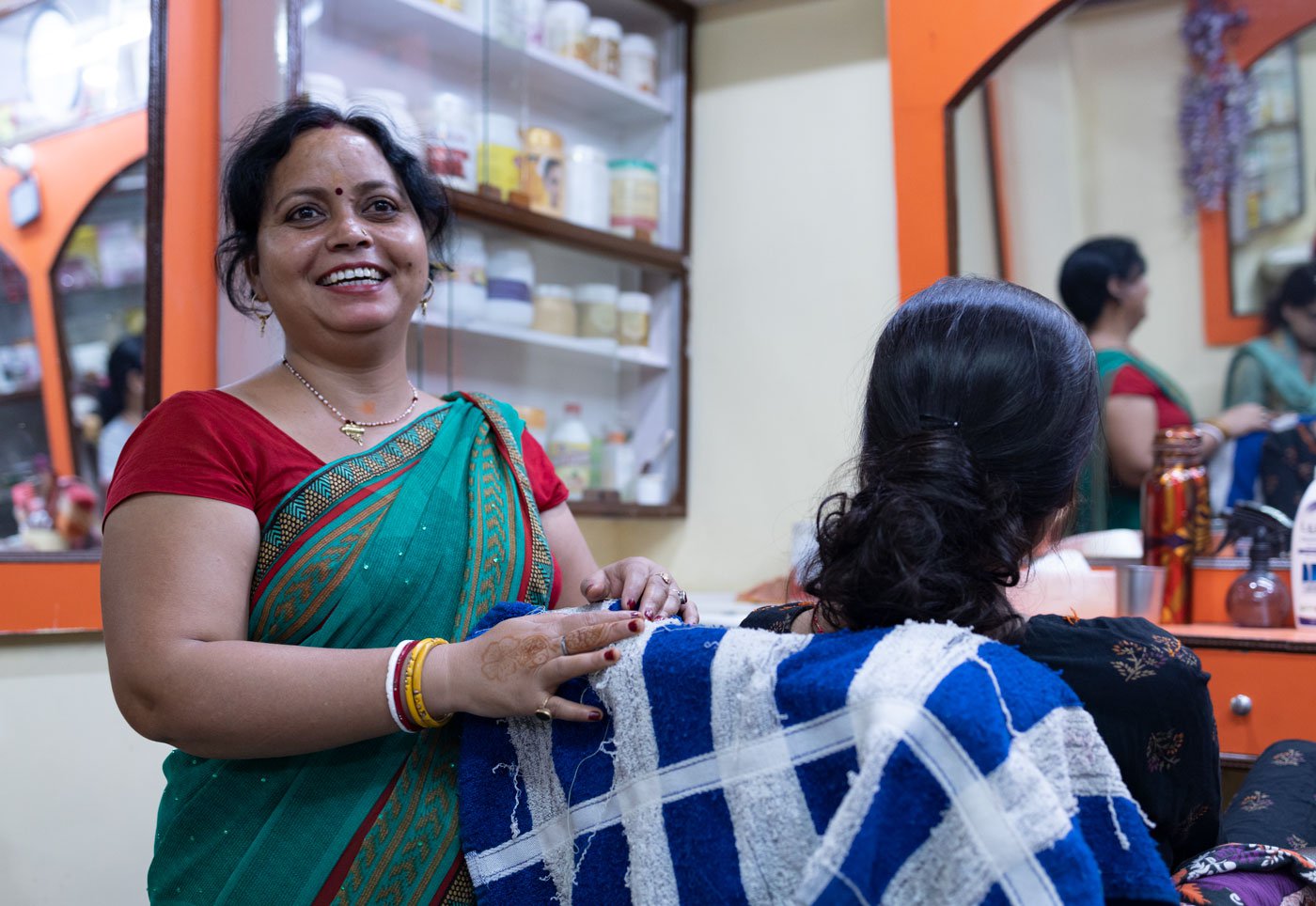
Left: Khushboo Singh lives in Jamui town and visits the parlour for a range of beauty services. Right: Pramila in her parlour with a customer
Pramila’s parlour can be found on the ground floor of a busy commercial complex on Maharajganj main road. She rents this small windowless room for Rs. 3,500 a month. Large mirrors are tacked like a strip across three walls. Piggy banks, fluffed-up teddy bears, packets of sanitary pads and a wide variety of cosmetic products crowd the shelved glass cabinets above the mirrors. Plastic flowers hang from the ceiling; framed certificates marking her successful completion of beauty courses are placed prominently on the beige and orange walls.
The yellow curtain screening the front door parts and a customer walks in. The 30-year-old well-dressed lady is going out for dinner and needs to have any hair on her upper lip removed and her eyebrows shaped. Although it’s near closing time, in the beauty business one can’t be too particular about timings or customers may walk away. As she sits down, Pramila enquires about the occasion and begins friendly chit-chat. “ Hum thoda hassi mazaak karenge ki skin mein andar se nikhaar aaye [We make our client laugh and then she glows from within],” she later tells us.
“In a day I may get over 25 women who walk in to define their eyebrows. But some days not even five customers,” says Pramila, pointing out the uncertainty in the beauty business. When she has an appointment to do make-up for a bride, her daily earnings shoot up to Rs. 5,000 or more. “Earlier we used to get many bridal customers, but now most women just do it themselves [by watching videos] on their phones,” she says. To make the services more attractive, Pramila has a combination offer: Rs. 30 for both defining eyebrows and removing hair from the upper-lip.
Attracting older women is still a challenge. Priya says she has rarely seen any woman of an older generation like her mother visit: “My mother has never gotten her eyebrows done or even a haircut. She doesn’t understand why we get our underarms waxed and says, ‘this is who I am naturally and this is how God made me, so why would I change anything?’.”
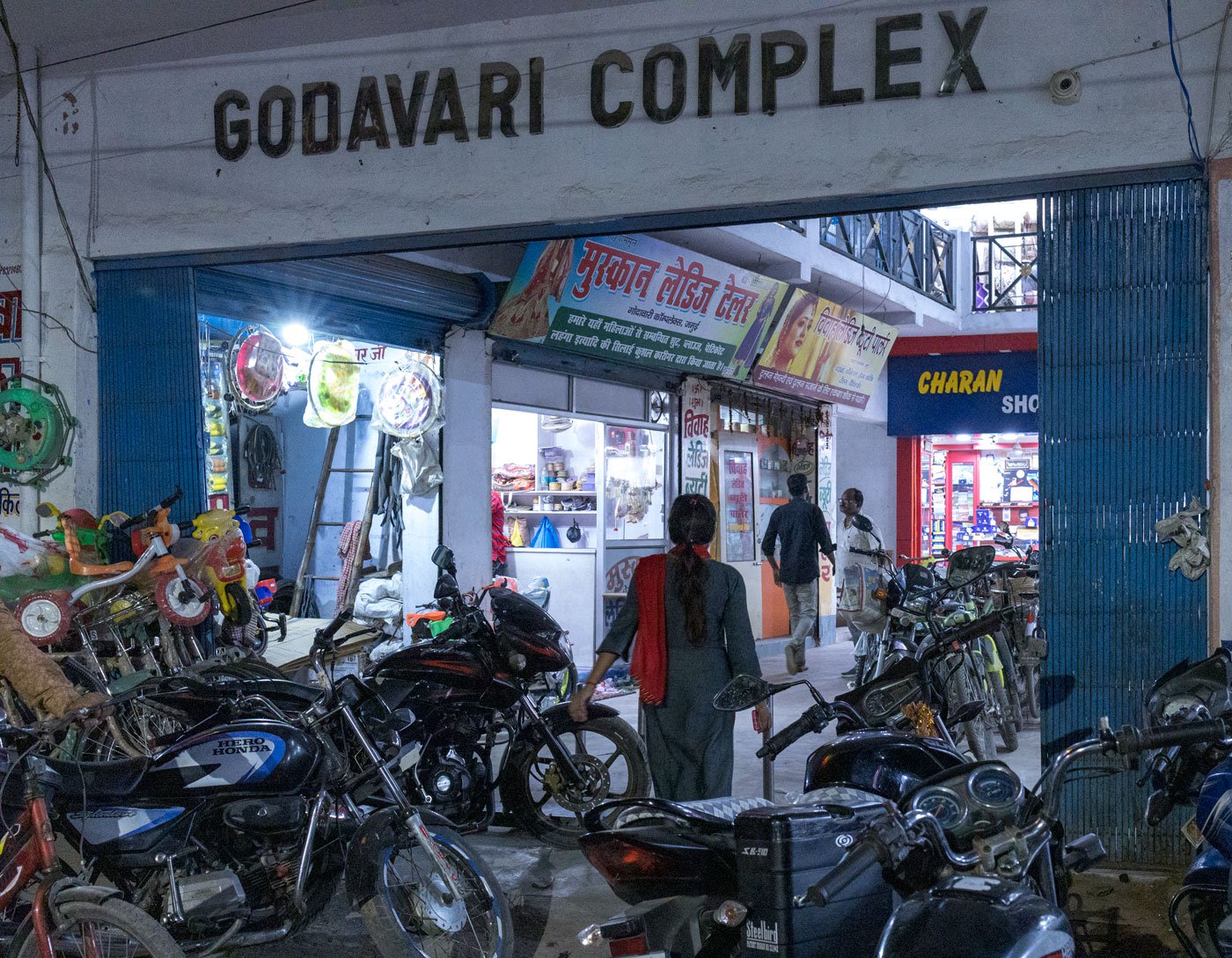
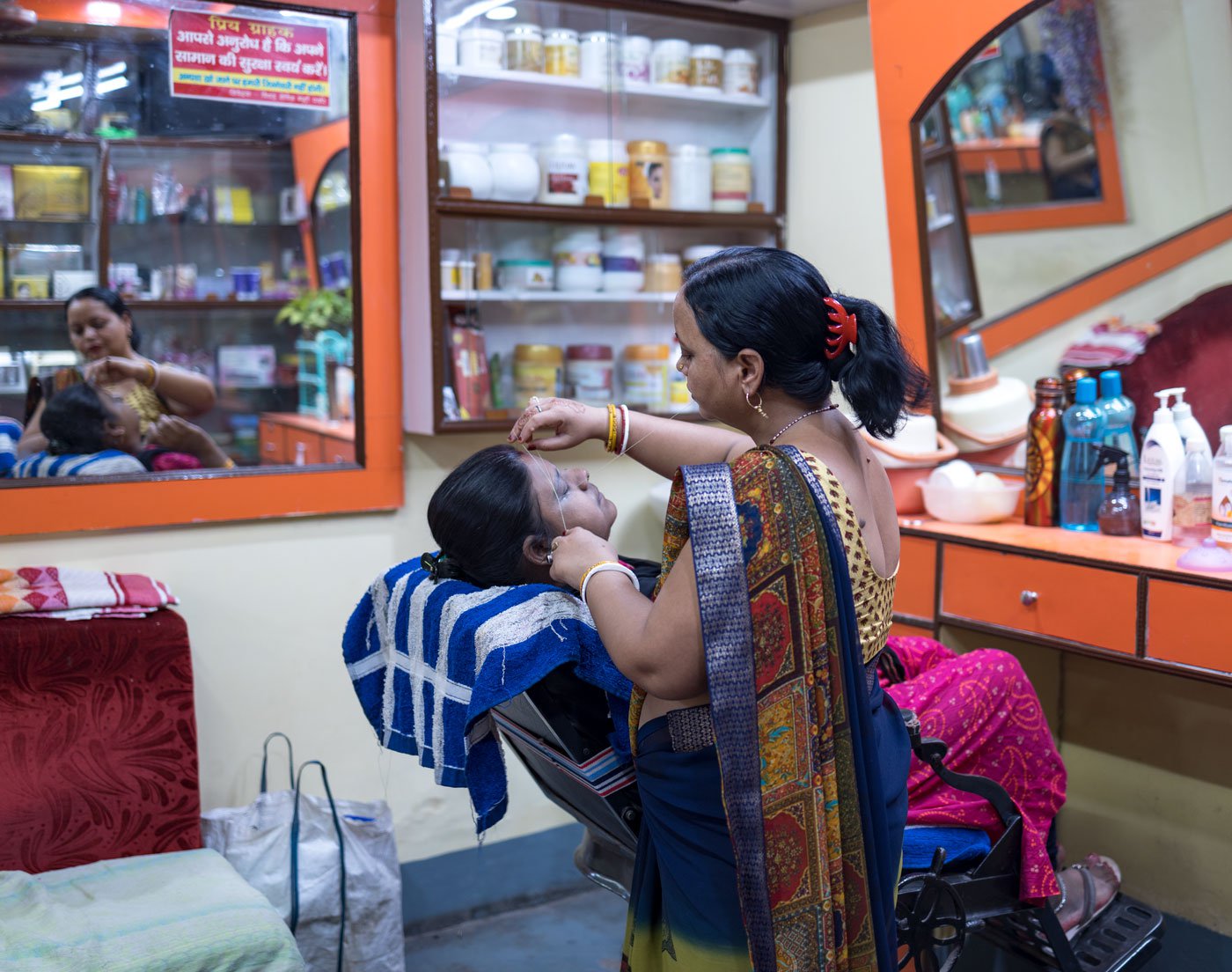
Left: The parlour is centrally located in a busy commercial complex in Jamui town . Right: Pramila threading a customer's eyebrows
It’s 5 p.m. and a mother with her two teenage daughters walks in. Tabassim Malik settles herself next to Pramila, while her daughters remove their hijab and settle into black vinyl-covered barber’s chairs. An orange table is covered with the tools of the trade – scissors, combs, a wax heater, two piles of visiting cards, spools of eyebrow thread, bottles of powder and various lotions sit neatly in their places.
“Don’t you have three girls? Did one get married?” asks Pramila, displaying an intimate knowledge of her customers’ lives.
“She is studying now,” says Tabassim, “After she finishes school, we will think about it.”
Pramila nods from her seat on the sofa. While chatting with Tabassim she is also keenly watching her trainees, Tuni and Rani, prepare for the girls’ haircuts to be done one after the other. The two stylists hover around the eager 12-year-old Jasmine who wants the trendy ‘U’ cut which costs Rs. 80. “Don’t lift the scissors from the hair till you finish the U-shape,” says Pramila, and Tuni nods in affirmation.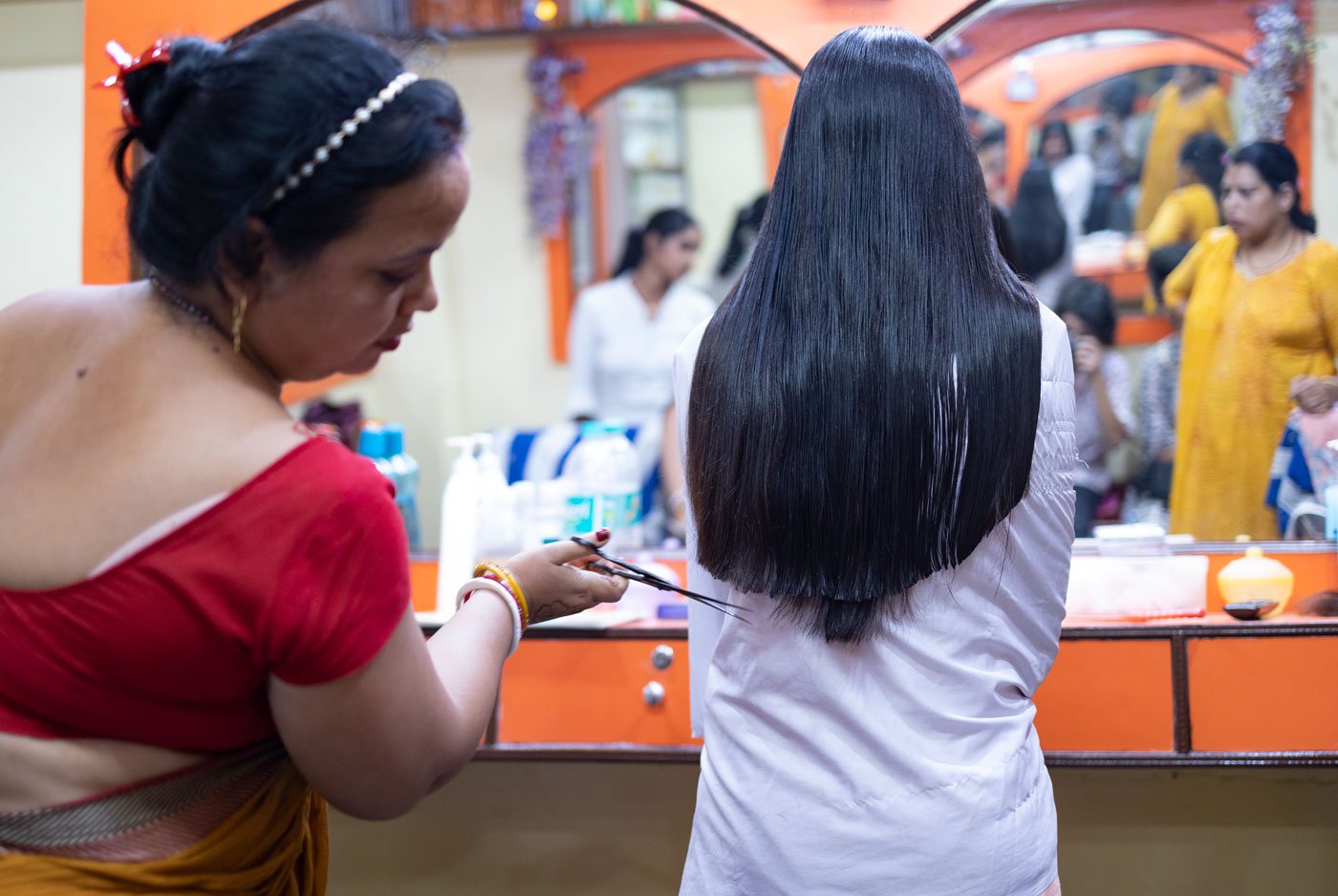
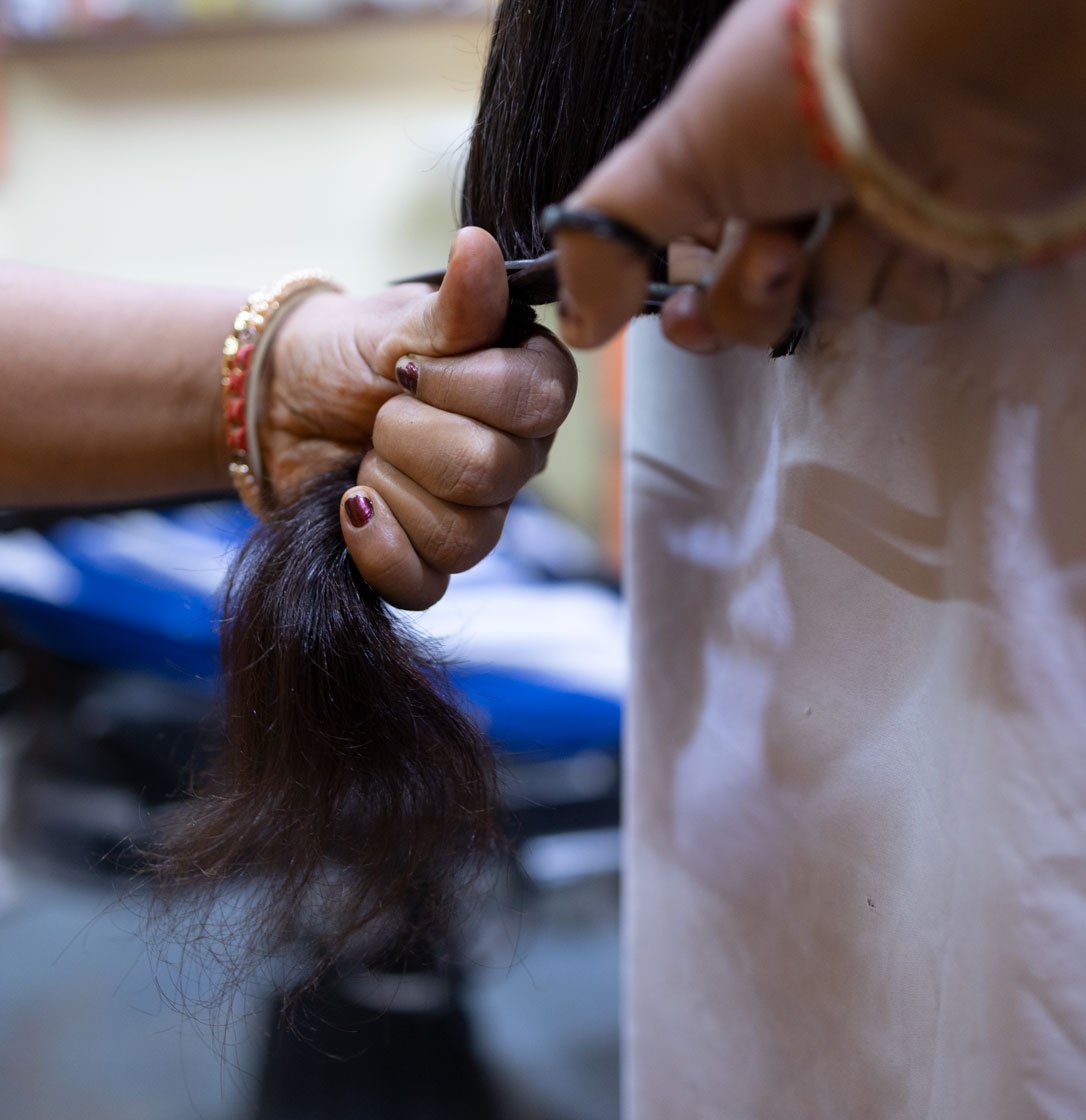
Left: Pramila also trains young girls like Tuni Singh (yellow kurta) who is learning as she cuts 12-year-old Jasmine’s hair. Right: The cut hair will be sold by weight to a wig manufacturer from Kolkata
One haircut has been handled by the trainees but the second one will be done by Pramila. She takes the heavy metal scissors from her young assistant and begins to trim, cut and style the young head in front of her.
In 15 minutes the haircuts are over and Rani bends down to lift the long locks. She carefully ties them with a rubber band. Later the hair will be sold by weight to a wig manufacturer from Kolkata, half a day’s journey by train.
“I will see them again next year,” says Pramila, as the mother and daughters exit her parlour. “They come for a haircut only once a year before Eid.” Knowing her customers, remembering their tastes and keeping up a genial chatter are all part of Pramila’s USP.
But it’s not all mascara and blush for this entrepreneur. She is up at 4 a.m. to finish the housework and send her children – Priya and Priyanshu – to school. Before leaving home, Pramila must fill and carry around 10 litres of water with her to the parlour as there is no running water in the shopping complex where the parlour is located. “How can you run a parlour without running water?” she asks.
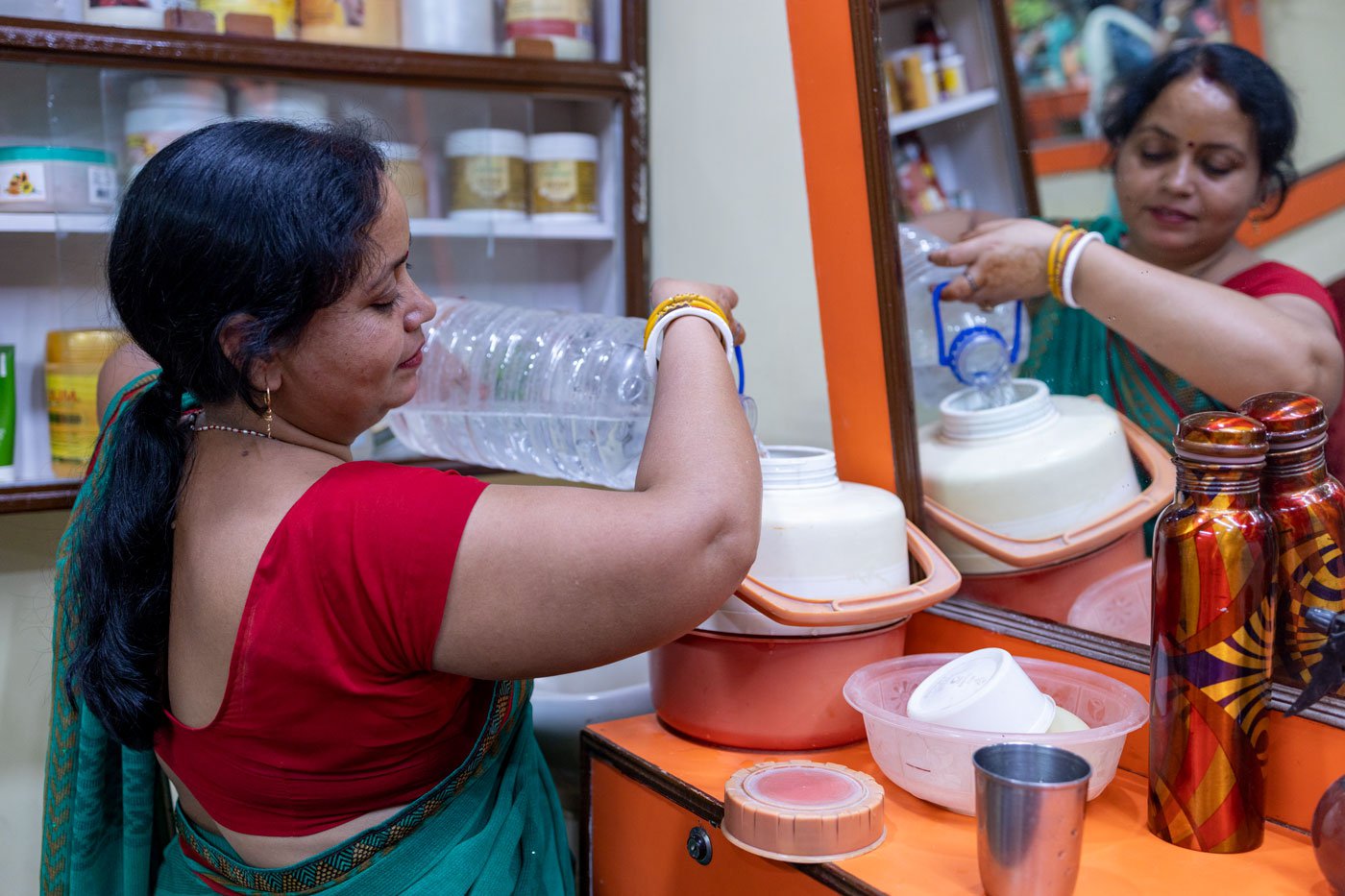
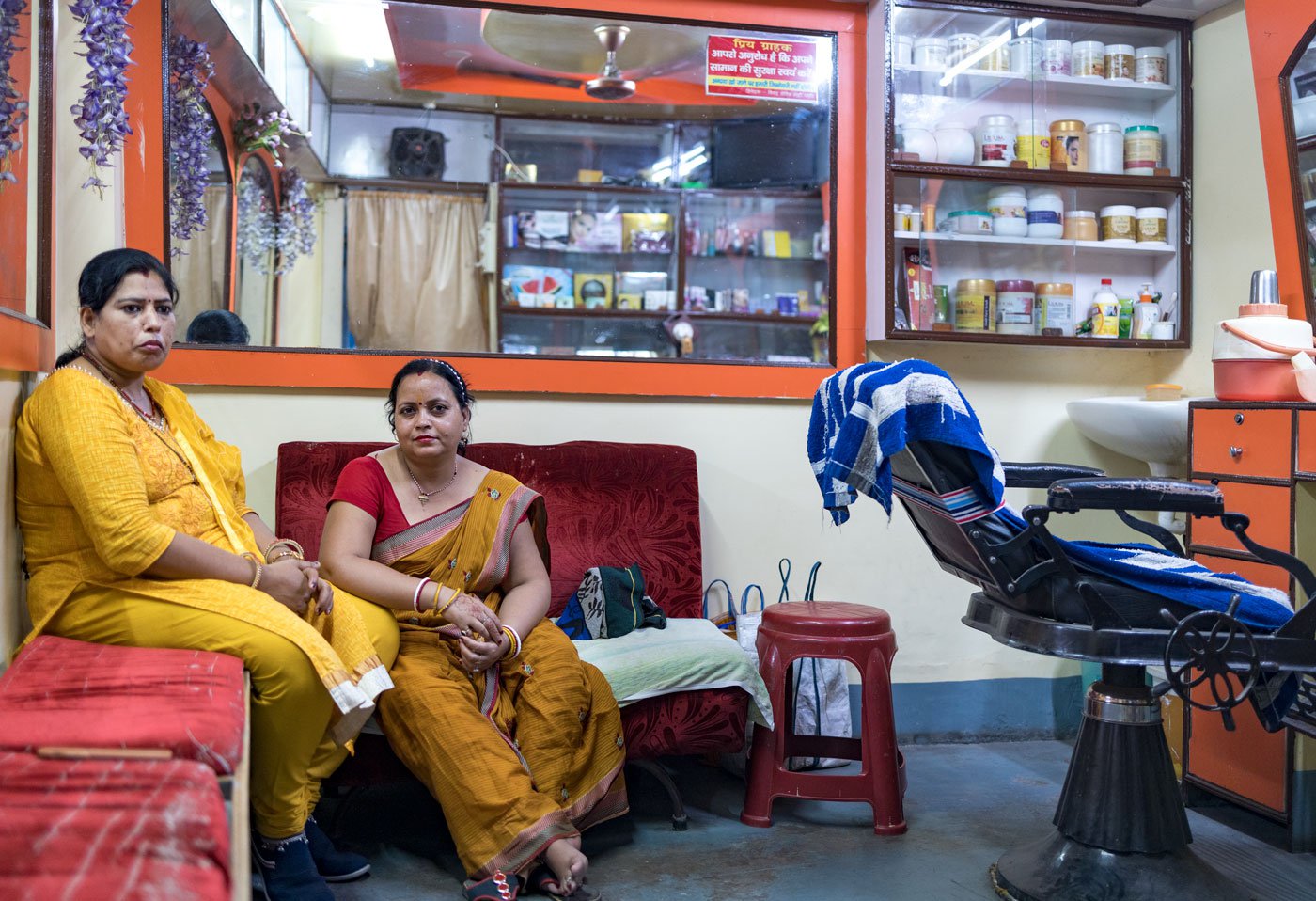
Left: Pramila brings around 10 litres of water with her from home as there is no running water in the shopping complex where the parlour is located. 'How can you run a parlour without running water?' she asks. Right: Tunni and Pramila relaxing while waiting for their next customer
Vivah Ladies Beauty Parlour opens at 10 a.m. and closes 11 hours later. The only holidays are when Pramila is ill or has guests at home. Every morning she leaves home before 10 a.m. with her husband Rajesh. He drops her off on his motorbike before proceeding to his shop, less than a kilometre from there. “My husband is an artist,” Pramila says proudly. “He paints signboards and bridges, engraves granite, designs backdrops for wedding baraats and DJ tempos, and more,” she adds.
On the days Pramila is getting delayed, Rajesh waits for her outside his shop and spends time chatting with his friends.
“There are no Sundays in this business. When neighbours come for appointments to my house, I charge them too!” says Pramila. Customers who bargain or downright refuse to pay are dealt with sternly: “If the customer is arrogant, then we show them their place.”
The owner of Vivah Ladies Beauty Parlour grew up in the coal town of Durgapur in West Bengal, where her father was a foreman in the Eastern Coalfields Limited and her mother took care of the family of eight. Every year, Pramila and her five siblings – three brothers and two sisters – would make an annual visit to their maternal grandmother’s house in Jamui.
Soon after finishing Class 12 in the year 2000, Pramila married Rajesh Kumar and was back in Jamui. Seven years into their marriage, she says her husband would go to work, and her children to school. Unused to being alone at home, she toyed with the idea of opening a beauty parlour. It helped that her husband was supportive. “Customers come and I speak and joke with them; the stress [of loneliness] goes away,” she explains.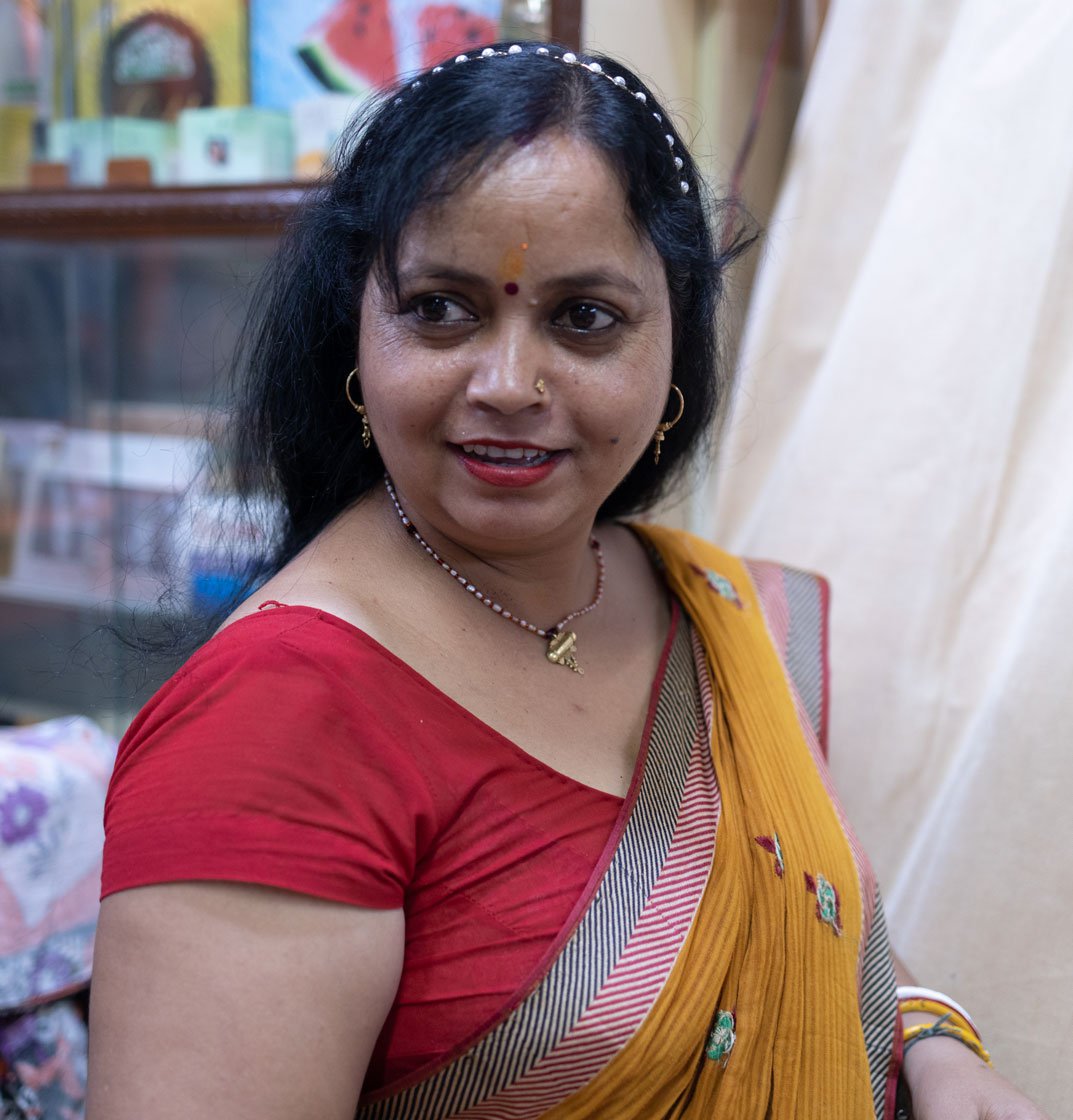
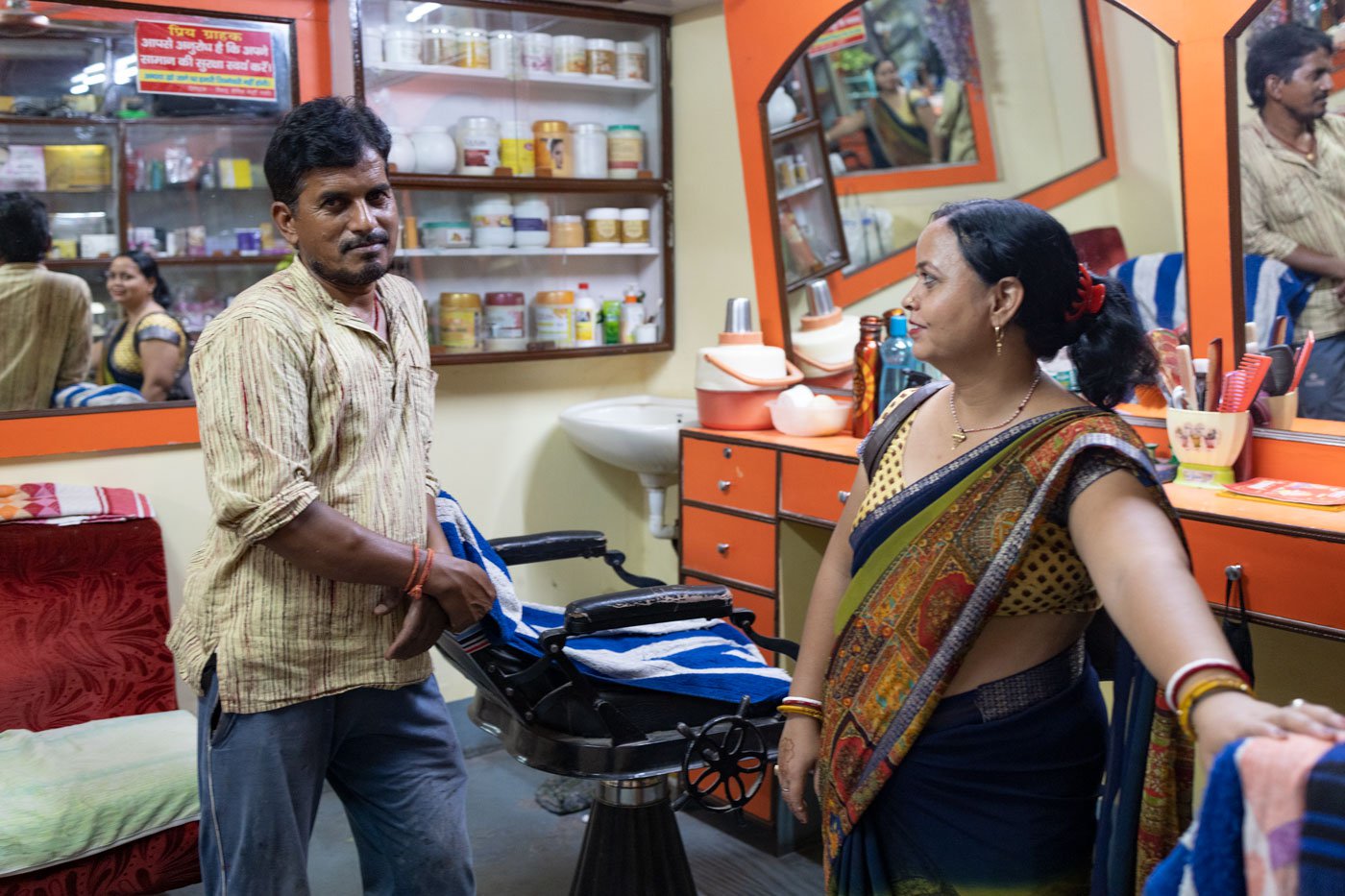
Left: Pramila posing for the camera. Right: Pramila's husband Rajesh paints signboards and designs backdrops for weddings and other functions
In 2007 when she wanted to learn the skills there weren’t too many beauty training courses but Pramila found two in Jamui. Her family paid for both: a six-month long training at Akarshak Parlour that cost Rs. 6,000 and another at Fresh Look, for Rs. 2,000.
Now 15 years into the trade Pramila regularly attends training workshops across Bihar that are conducted by different cosmetic brands. In turn she says, “I’ve trained more than 50 women and many of them start their own parlours. Some in neighbouring villages.”
As we are winding up the interview, Pramila Sharma touches up her red lipstick. She picks up a crayon of kohl, darkens her eyes and settles down on the scarlet-covered sofa in her parlour.
“I’m not beautiful, but you can take my photograph,” she says.
